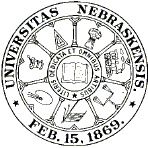
University Studies (University of Nebraska) (1888–1984)
Date of this Version
10-1967
Citation
University of Nebraska Studies: New Series no. 35
Abstract
Armand Salacrou is generally recognized to be one of the outstanding French playwrights whose literary careers began between the two World Wars. Salacrou has written about thirty plays. Many of them have been produced at the leading theatrical centers in Europe, and some have earned success and fame for the author on African and Asian stages. Unlike the other distinguished dramatists of his generation such as Giraudoux, Anouilh, Sartre, and Cocteau, Salacrou's name has remained almost unknown to the theater audiences in this country. A number of his plays have been published in Italian, Spanish, German, Russian, and Japanese translations, but there are no publications in English as yet.
As in the works of his contemporaries-Sartre, Camus, Giraudoux, Anouilh-the major preoccupation of Salacrou is man and his place in the universe. Adumbrating Surrealist moods, Salacrou's first plays are almost totally introspective. They introduce the main themes that with varying intensity are found in his subsequent work. Virtually all of Salacrou's plays inquire into the purpose of man's existence, into man's relationship to himself, to God, and to his past. These themes are interwoven with other problems of a metaphysical nature such as determinism and free will, and at times they reflect the author's search for faith and transcendental values of human existence. Salacrou's preoccupation with universal issues has not changed fundamentally in the course of more than forty years. This persistence of themes has led to some degree of repetition but also has lent unity to Salacrou's theater.
In form and mood, Salacrou's work presents a striking variety. In an unpredictable sequence, Salacrou has produced Surrealist dream plays, realistic character sketches, plays with distortions of reality in the Expressionist manner, hybrids of boulevard theater and naturalism, farces, vaudevilles, a psychodrama, and an approximation of the Brechtian epic theater. The principal purpose of this study is to examine the relationship between the conceptual content and the various dramatic modes and forms of expression in Salacrou's plays.


Comments
Published by The University of Lincoln